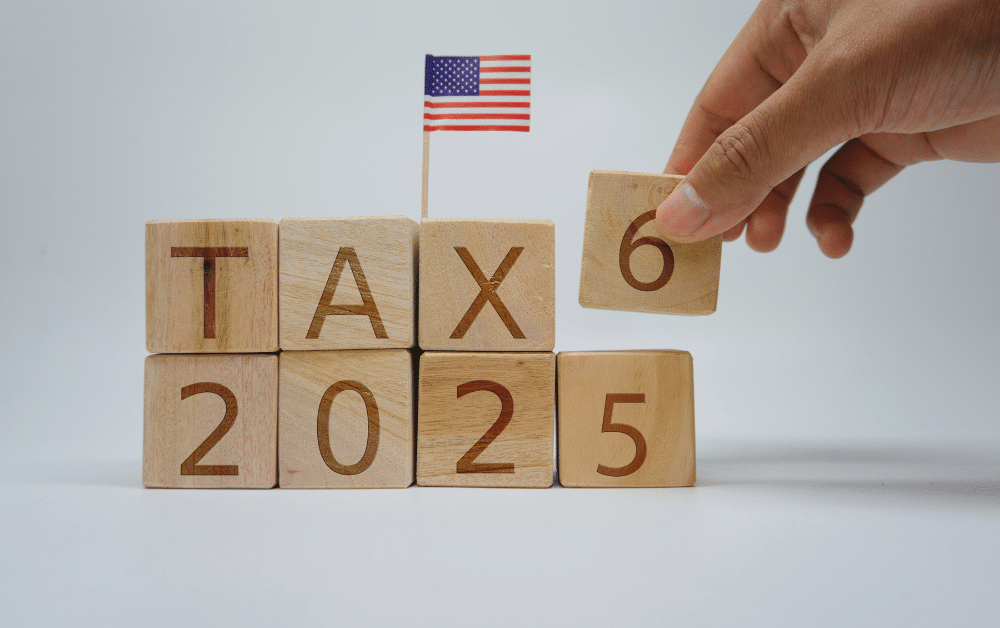IRS 2026 Tax Inflation Adjustments: FEIE Increases to $132,900 for American Expats

October 9, 2025 – The Internal Revenue Service announced 2026 tax inflation adjustments that significantly benefit Americans living abroad. The Foreign Earned Income Exclusion (FEIE) increases to $132,900, standard deductions rise to $32,200 for married couples filing jointly, and more than 60 tax provisions receive inflation adjustments for the tax year 2026.
Key Numbers for 2026:
- Foreign Earned Income Exclusion: $132,900 (up from $130,000 in 2025)
- Standard Deduction (Married Filing Jointly): $32,200
- Standard Deduction (Single): $16,100
- Standard Deduction (Head of Household): $24,150
- Combined FEIE for qualifying married couples: $265,800
The announcement in Revenue Procedure 2025-32 includes changes from the One Big Beautiful Bill (OBBB) passed earlier in 2025. These adjustments apply to tax year 2026, which taxpayers will file in 2027. For American expats, combining the increased FEIE with higher standard deductions means most will owe zero US federal income tax for 2026.
What Is the 2026 Foreign Earned Income Exclusion Amount?
The 2026 Foreign Earned Income Exclusion (FEIE) is $132,900 per qualifying taxpayer. This represents a $2,900 increase from the 2025 FEIE of $130,000, marking one of the largest dollar increases in recent years.
Married couples filing jointly where both spouses qualify can exclude a combined $265,800 in foreign earned income from US taxation. This exclusion applies to wages, salaries, bonuses, and self-employment income earned while living and working abroad.
To qualify for the 2026 FEIE, expats must meet one of two residency tests:
- Physical Presence Test: Be physically present in a foreign country for at least 330 full days during any 12-month period. Learn more about the Physical Presence Test requirements.
- Bona Fide Residence Test: Establish bona fide residence in a foreign country for an uninterrupted period that includes an entire tax year (January 1 to December 31). Details on the Bona Fide Residence Test.
Taxpayers must file Form 2555 with their Form 1040 to claim the FEIE. Failing to attach Form 2555 means forfeiting the exclusion, regardless of how long you’ve lived abroad or how much you qualify for.
What Are the 2026 Standard Deduction Amounts for Expats?
The 2026 standard deduction amounts increased across all filing statuses:
- Married Filing Jointly: $32,200 (increase of $700 from 2025)
- Single Filers: $16,100 (increase of $350 from 2025)
- Married Filing Separately: $16,100 (increase of $350 from 2025)
- Head of Household: $24,150 (increase of $525 from 2025)
How the standard deduction works with FEIE: The standard deduction applies after the FEIE, creating a powerful combination for eliminating US tax liability.
Example: A single expat earning $145,000 in 2026 claims the $132,900 FEIE, leaving $12,100 in taxable income. The $16,100 standard deduction eliminates this remaining amount entirely, resulting in zero US federal tax owed.
The One, Big, Beautiful Bill also retroactively increased 2025 standard deductions, so expats will benefit on both their 2025 returns (filed in 2026) and 2026 returns (filed in 2027).
What Are the 2026 Tax Brackets and Rates?
The IRS adjusted all seven federal income tax brackets upward for inflation in 2026. The 2026 tax rates remain 10%, 12%, 22%, 24%, 32%, 35%, and 37%, but income thresholds increased:
| Tax Rate | Single Filers | Married Filing Jointly | Head of Household |
| 10% | $0 – $12,400 | $0 – $24,800 | $0 – $17,700 |
| 12% | $12,401 – $50,400 | $24,801 – $100,800 | $17,701 – $50,400 |
| 22% | $50,401 – $105,700 | $100,801 – $211,400 | $50,401 – $105,700 |
| 24% | $105,701 – $201,775 | $211,401 – $403,550 | $105,701 – $201,775 |
| 32% | $201,776 – $256,225 | $403,551 – $512,450 | $201,776 – $256,225 |
| 35% | $256,226 – $640,600 | $512,451 – $768,700 | $256,226 – $640,600 |
| 37% | Over $640,600 | Over $768,700 | Over $640,600 |
For expats: Most Americans living abroad won’t pay these rates because the FEIE or Foreign Tax Credit eliminates taxable income. However, these brackets apply to:
- Income exceeding the $132,900 FEIE limit
- US-sourced income like rental properties
- Investment income and capital gains
- Income that doesn’t qualify as “foreign earned income”
How Do I Calculate My 2026 Expat Tax Liability?
Most American expats owe zero US federal income tax when they correctly apply available exclusions and credits. Here’s how to calculate your 2026 tax liability:
Step 1: Calculate total worldwide income
Step 2: Claim Foreign Earned Income Exclusion (up to $132,900) by filing Form 2555
Step 3: Claim Foreign Housing Exclusion if you qualify (employees) or Foreign Housing Deduction (self-employed)
Step 4: Apply standard deduction ($16,100 single, $32,200 married filing jointly)
Step 5: For any remaining taxable income, claim Foreign Tax Credit on Form 1116 for foreign taxes paid
Example calculation for 2026:
- Gross income: $150,000
- FEIE: -$132,900
- Remaining income: $17,100
- Standard deduction: -$16,100 (single)
- Taxable income: $1,000
- US tax owed: Approximately $100 (10% bracket)
With the Foreign Tax Credit applied for taxes paid to your country of residence, most expats reduce even this small amount to zero.
What Other 2026 Tax Changes Affect American Expats?
Employer-Provided Childcare Tax Credit:
Increased from $150,000 to $500,000 ($600,000 for eligible small businesses). This 233% increase benefits expat entrepreneurs and businesses operating abroad that employ Americans.
Earned Income Tax Credit (EITC):
Maximum EITC for families with three or more children: $8,231 (up from $8,046). The credit remains refundable.
Adoption Credit:
Maximum credit for qualified adoption expenses: $17,670 (up from $17,280), with $5,120 refundable. Applies to both domestic and international adoptions.
Alternative Minimum Tax (AMT) Exemptions:
- Single filers: $90,100 (phase-out begins at $500,000)
- Married filing jointly: $140,200 (phase-out begins at $1,000,000)
Note: AMT limits FEIE usage but allows Foreign Tax Credit
Estate Tax Basic Exclusion:
$15,000,000 for decedents dying in 2026 (up from $13,990,000 in 2025)
Health Flexible Spending Accounts:
Contribution limit $3,400 (up $100), carryover maximum $680
Foreign Housing Exclusion:
Base amount expected to increase proportionally with FEIE to approximately $21,264 (16% of $132,900). High-cost city limits are significantly higher.
Do I Need to File US Taxes If I Live Abroad in 2026?
Yes. U.S. citizens and green card holders are required to file U.S. tax returns, regardless of their place of residence. The United States uses citizenship-based taxation, meaning you must report worldwide income to the IRS even if you’ve lived abroad for years and pay taxes in your country of residence.
2026 filing thresholds:
- Single under 65: $14,600
- Married filing jointly (both under 65): $29,200
- Head of household under 65: $21,900
However, filing doesn’t mean owing taxes. The 2026 FEIE ($132,900), Foreign Tax Credit, and other expat benefits typically reduce U.S. expat tax liability to zero.
You must file a return and claim these exclusions. They don’t apply automatically. Missing Form 2555 means losing the entire FEIE benefit.
When are the 2026 Expat Tax Filing Deadlines?
For 2026 tax year (filed in 2027):
- April 15, 2027: Standard filing deadline
- June 15, 2027: Automatic expat extension (no form required if living abroad)
- October 15, 2027: Extended deadline (requires Form 4868 filed before June 15)
For 2025 tax year (filed in 2026):
- April 15, 2026: Standard filing deadline
- June 15, 2026: Automatic expat extension
- October 15, 2026: Extended deadline with Form 4868
FBAR (Foreign Bank Account Report) deadlines:
- April 15 with automatic extension to October 15
- Required if foreign accounts exceeded $10,000 at any point during the year
- Learn about FBAR filing requirements
Critical: Interest accrues on unpaid taxes from the April 15 original due date, even if you file under the automatic June 15 expat extension. Complete deadline information.
Which Tax Strategy Is Better: FEIE or Foreign Tax Credit?
The answer depends on your specific situation:
Use FEIE when:
- You live in a low-tax country (UAE, Singapore, Panama, certain Caribbean nations)
- Your earned income is below $132,900
- You want to contribute to Roth IRAs (FEIE income can count toward contribution limits)
- You have minimal foreign taxes paid
Use Foreign Tax Credit when:
- You live in a high-tax country (UK, Germany, France, Canada, Australia, Japan)
- Your income exceeds $132,900
- You paid substantial foreign income taxes
- You want to preserve Social Security credits
- You’re subject to AMT
Use both strategically:
- Claim FEIE on earned income up to $132,900
- Claim Foreign Tax Credit on passive income (dividends, interest, capital gains)
- Claim Foreign Tax Credit on earned income above the FEIE limit
- This combination maximizes tax savings
What If I Haven’t Filed US Taxes While Living Abroad?
The IRS offers Streamlined Filing Compliance Procedures for Americans who unintentionally failed to file:
Requirements:
- File the last 3 years of tax returns
- File the last 6 years of FBARs (if applicable)
- Submit Form 14653 certifying non-willful failure to file
Benefits:
- No penalties for qualifying taxpayers living abroad
- Avoids failure-to-file penalties (normally 5% per month)
- Avoids FBAR penalties (up to $10,000+ per year)
- Restores tax compliance
Cost: Greenback offers streamlined filing for a flat fee of $1,600, covering all required forms and filings.
Most expats who catch up through streamlined procedures discover they owe little or nothing in actual taxes after applying the FEIE and Foreign Tax Credit retroactively.
2026 Tax Planning Strategies for Expats
- Review your residency tests: Ensure you’ll qualify for FEIE under Physical Presence or Bona Fide Residence for 2026. Track days carefully if using Physical Presence (330 out of 365 days required).
- Calculate housing costs: If you live in an expensive city, the Foreign Housing Exclusion can exclude thousands more beyond the FEIE.
- Plan major purchases: Timing real estate purchases or relocations around the FEIE qualification periods can maximize benefits.
- Consider FEIE revocation carefully: Once you revoke FEIE, you cannot use it again for 5 years without IRS permission. This matters if you plan to move to a low-tax country.
- Coordinate with foreign tax planning: Some countries offer tax benefits for new residents. Coordinate US and foreign strategies for optimal results.
- Don’t miss mid-year prorations: If you moved abroad during 2026, you can still prorate your FEIE based on qualifying days.
Key Takeaways: 2026 Tax Year for American Expats
✓ Foreign Earned Income Exclusion increases to $132,900 ($265,800 for qualifying married couples)
✓ Standard deductions rise to $32,200 (married), $16,100 (single), $24,150 (head of household)
✓ Combined benefits mean most expats owe zero US federal income tax for 2026
✓ Must file Form 2555 to claim FEIE and Form 1116 for Foreign Tax Credit
✓ Automatic 2-month extension to June 15, 2027, for Americans living abroad (no form required)
✓ Tax brackets adjusted upward, but most expats won’t reach taxable income levels
✓ Streamlined procedures available for late filers to catch up without penalties
✓ FBAR required if foreign accounts exceeded $10,000 at any time during the year
✓ These adjustments apply to the 2026 tax year, filed in 2027
Next Steps for American Expats
- For 2026 planning: Calculate how the $132,900 FEIE and increased standard deductions affect your situation. Consider timing for major financial decisions.
- For 2025 filing: Remember your June 15, 2026, deadline. The OBBB retroactively increased 2025 benefits as well.
- For late filers: Don’t wait. Streamlined procedures offer penalty relief, and most expats discover they owe nothing after applying proper exclusions and credits.
If you’re ready to be matched with a Greenback accountant, click the get started button below. For general questions on expat taxes or working with Greenback, contact our Customer Champions.
This article is for informational purposes only and does not constitute personalized tax advice. Tax laws are complex and subject to change. Always consult with a qualified tax professional regarding your specific situation.



